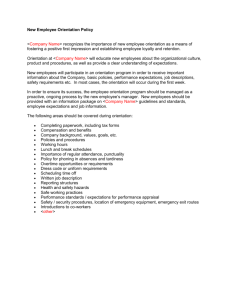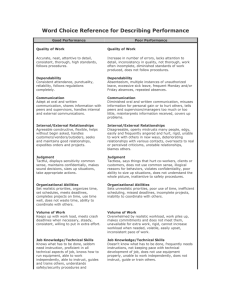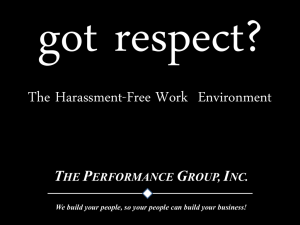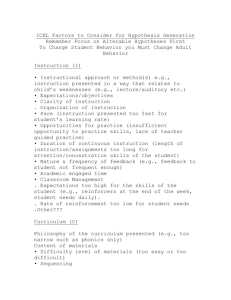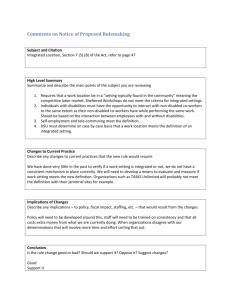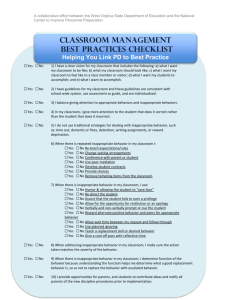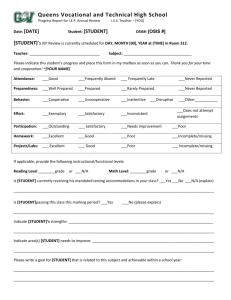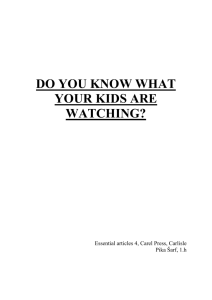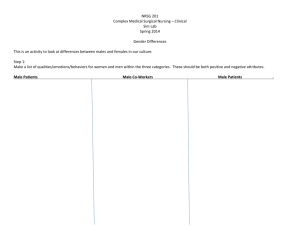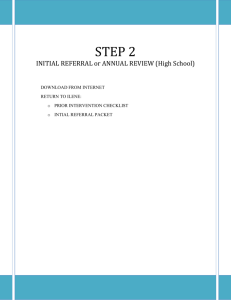BEHAVIORAL OBSERVATIONS OF POOR PERFORMANCE
advertisement
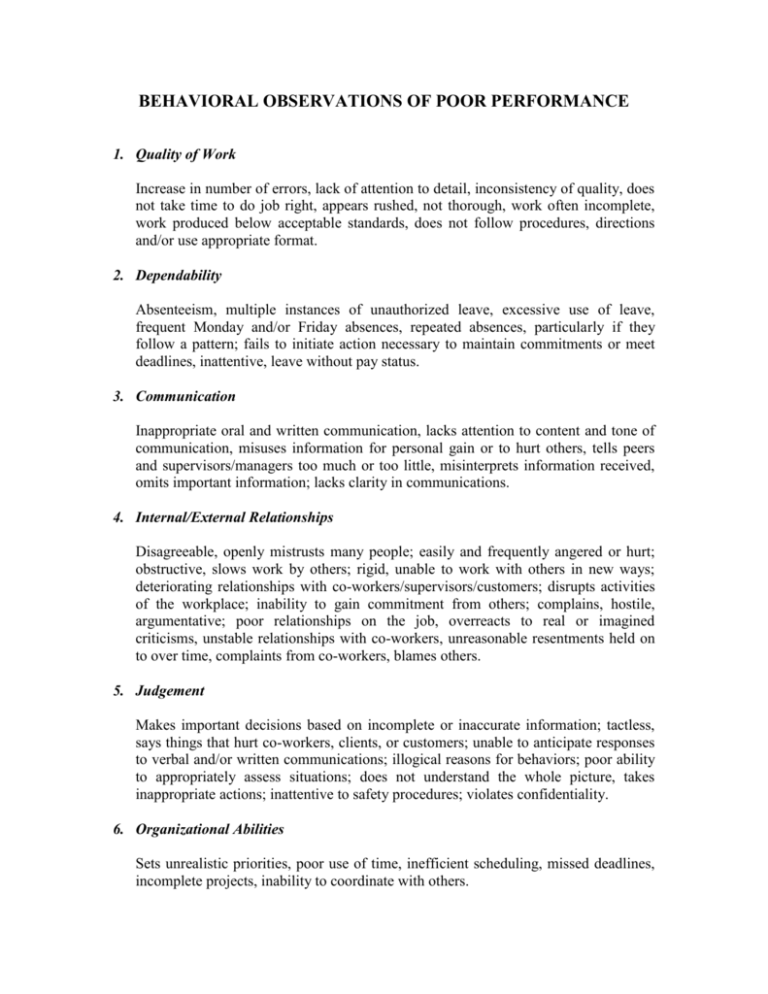
BEHAVIORAL OBSERVATIONS OF POOR PERFORMANCE 1. Quality of Work Increase in number of errors, lack of attention to detail, inconsistency of quality, does not take time to do job right, appears rushed, not thorough, work often incomplete, work produced below acceptable standards, does not follow procedures, directions and/or use appropriate format. 2. Dependability Absenteeism, multiple instances of unauthorized leave, excessive use of leave, frequent Monday and/or Friday absences, repeated absences, particularly if they follow a pattern; fails to initiate action necessary to maintain commitments or meet deadlines, inattentive, leave without pay status. 3. Communication Inappropriate oral and written communication, lacks attention to content and tone of communication, misuses information for personal gain or to hurt others, tells peers and supervisors/managers too much or too little, misinterprets information received, omits important information; lacks clarity in communications. 4. Internal/External Relationships Disagreeable, openly mistrusts many people; easily and frequently angered or hurt; obstructive, slows work by others; rigid, unable to work with others in new ways; deteriorating relationships with co-workers/supervisors/customers; disrupts activities of the workplace; inability to gain commitment from others; complains, hostile, argumentative; poor relationships on the job, overreacts to real or imagined criticisms, unstable relationships with co-workers, unreasonable resentments held on to over time, complaints from co-workers, blames others. 5. Judgement Makes important decisions based on incomplete or inaccurate information; tactless, says things that hurt co-workers, clients, or customers; unable to anticipate responses to verbal and/or written communications; illogical reasons for behaviors; poor ability to appropriately assess situations; does not understand the whole picture, takes inappropriate actions; inattentive to safety procedures; violates confidentiality. 6. Organizational Abilities Sets unrealistic priorities, poor use of time, inefficient scheduling, missed deadlines, incomplete projects, inability to coordinate with others. 7. Volume of Work Overwhelmed by realistic workload, work piles up; makes commitments and does not meet them, unavailable for extra work; rigid, unable to increase workload when needed; volatile, easily upset, inconsistent pace of work. 8. Job Knowledge/Technical Skills Does not demonstrate level of understanding and/or ability to use technical/professional information; frequently needs instructions; not keeping pace with technical developments of job and/or profession; unable to use equipment required for competent level of performance; unable to work independently; does not instruct, guide, and train others. 9. Motivation Lack of commitment to job, unconcerned with quality of product/service, uninterested in nature of work and exhibits negative attitude, frequent references to job dissatisfaction, low energy level, needs frequent prodding to initiate activities, inability to work independently; unable to maintain level of activity to perform satisfactorily. 10. Reaction to Stress Difficulty in concentration; increased accident rate on and off the job; becomes upset over minor irritations, changes in plan, and new policies; poorly controlled emotions easily loses temper, yells, cries, withdraws. 11. Problem Solving Lacks analytical skills necessary to gather and analyze facts for determining the most likely causes of and potential solutions for problems; does not recognize a problem exists, cannot define the problem, one track mind, most problems have the same few causes or solutions; denies problem exists, blames others, covers up problems; excludes others from problem solving tasks. 12. Creativity Dismisses and/or is unwilling to try new ideas; habitual thought and behavior, same solutions for all problems; high security needs; fears risks, needs constant supervision and reassurance; over-reliance on structure, getting the job done well is not as important as following the rules; unquestioning; unable to generate new options. 13. Decisiveness Inability to weigh the consequences of alternative courses of action prior to making a decision; unwillingness to make decisions, asks too many people for advice, tries to solve a problem without thinking it through, does not ask necessary questions, acts impulsively, indecisive, equivocates or relies on ambiguity to avoid decisiveness. 14. Hygiene Inappropriate clothing; too casual or formal; appears unclean/unwashed; offensive odors. 15. Other Sexually inappropriate behavior.
